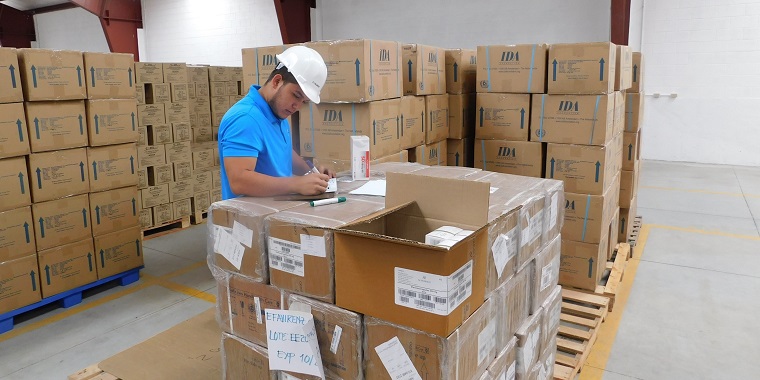
In October 2019, the Salvadoran Social Security Institute (SSI) asked USAID Global Health Supply Chain Program-Procurement and Supply Management (GHSC-PSM) project to identify a solution to the imminent stockout of dolutegravir 50mg (DTG) – an essential medication for the treatment of HIV. The SSI reached this critical point because of accelerated migration from existing treatment regimens to DTG-based regimens. Approximately 500 people living with HIV transitioned to this antiretroviral medicine (ARV).
When alerted to the potential stockout, GHSC-PSM immediately reviewed stock analysis reports and identified the Honduras Ministry of Health (MOH) as a potential source for replacement ARVs. In Honduras, the project confirmed the product’s availability and gained consent from the MOH to proceed with a transfer to El Salvador. The MOH in Honduras, the SSI in El Salvador and GHSC-PSM collaborated to mobilize the framework for a loan by which Honduras would provide El Salvador the needed DTG quantities and receive a return shipment of the same amount once they become available. The agreement also ensured that El Salvador’s SSI would cover all transportation and customs costs for the medicines.
By November 20th, 2019, the loan of 18,000 DTG tablets arrived at the El Salvador SSI Central Warehouse, within just four weeks of the initial request. This marked the first use of a legal framework established and implemented by the Council of Ministers of Health of Central America and the Dominican Republic (COMISCA).
The final step in the loan cycle will take place once El Salvador returns DTG stock to Honduras, but fulfillment has been delayed due to COVID-19 and its impact on the global supply chain. In May 2020, a partial shipment of 3,000 DTG tablets arrived at Honduras’ MOH Central Warehouse. The delivery date for the remaining balance has not yet been confirmed.
This exchange of ARVs is one example of the kind of ongoing support GHSC-PSM provides to PEPFAR-supported programs in El Salvador, Guatemala, Honduras and Panama. The project also participates in frequent discussions led by various ministries of health to review ARV stock status levels. These reviews offer key information about potential supply risks and product expiry, helping mobilize corrective actions, such as initiating ARV exchanges like in the example above and improving the use and rotation of ARVs regionally.
GHSC-PSM was alerted again in March 2020 by the El Salvador Ministry of Health regarding a potential shortage of TLD 300/300/50mg and Efavirenz 200mg. The project once more reviewed stock analysis reports and identified the Honduran Ministry of Health as a source of replenishment of these ARVs.
With the initial loan framework in place, the streamlined process quickly provided the needed ARVs from the Honduran Ministry of Health. As a result, in May 2020 30,000 TLD tables and 16, 200 Efavirenz tablets reached El Salvador.
The analysis considers ARV inventory levels at the central warehouses and HIV clinics, taking into account consumption data reported through the established logistics management information system (LMIS) and the anticipated orders and deliveries in the supply plan. Data on stock-on-hand, consumption and shipments are used to confirm months-of-stock availability.